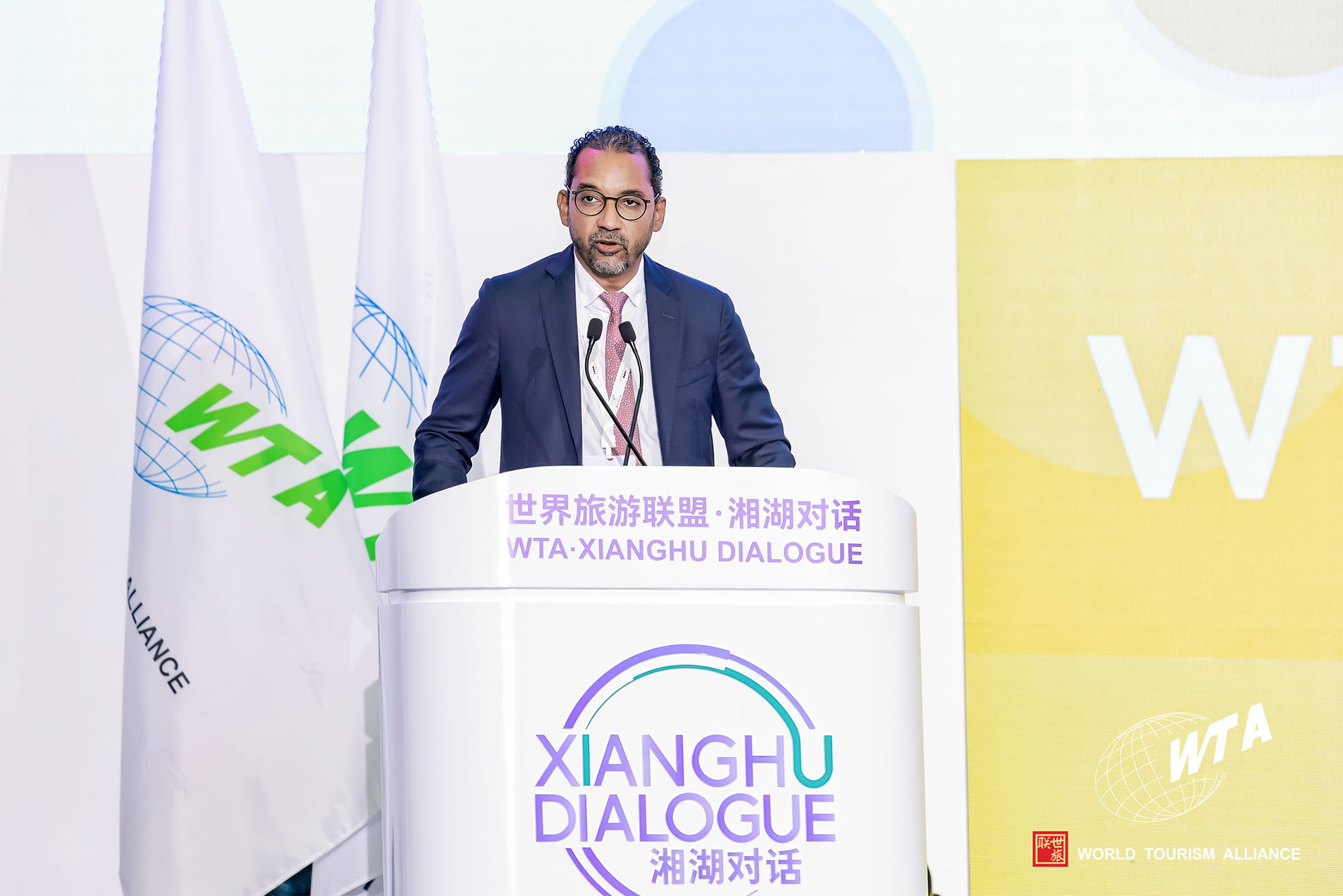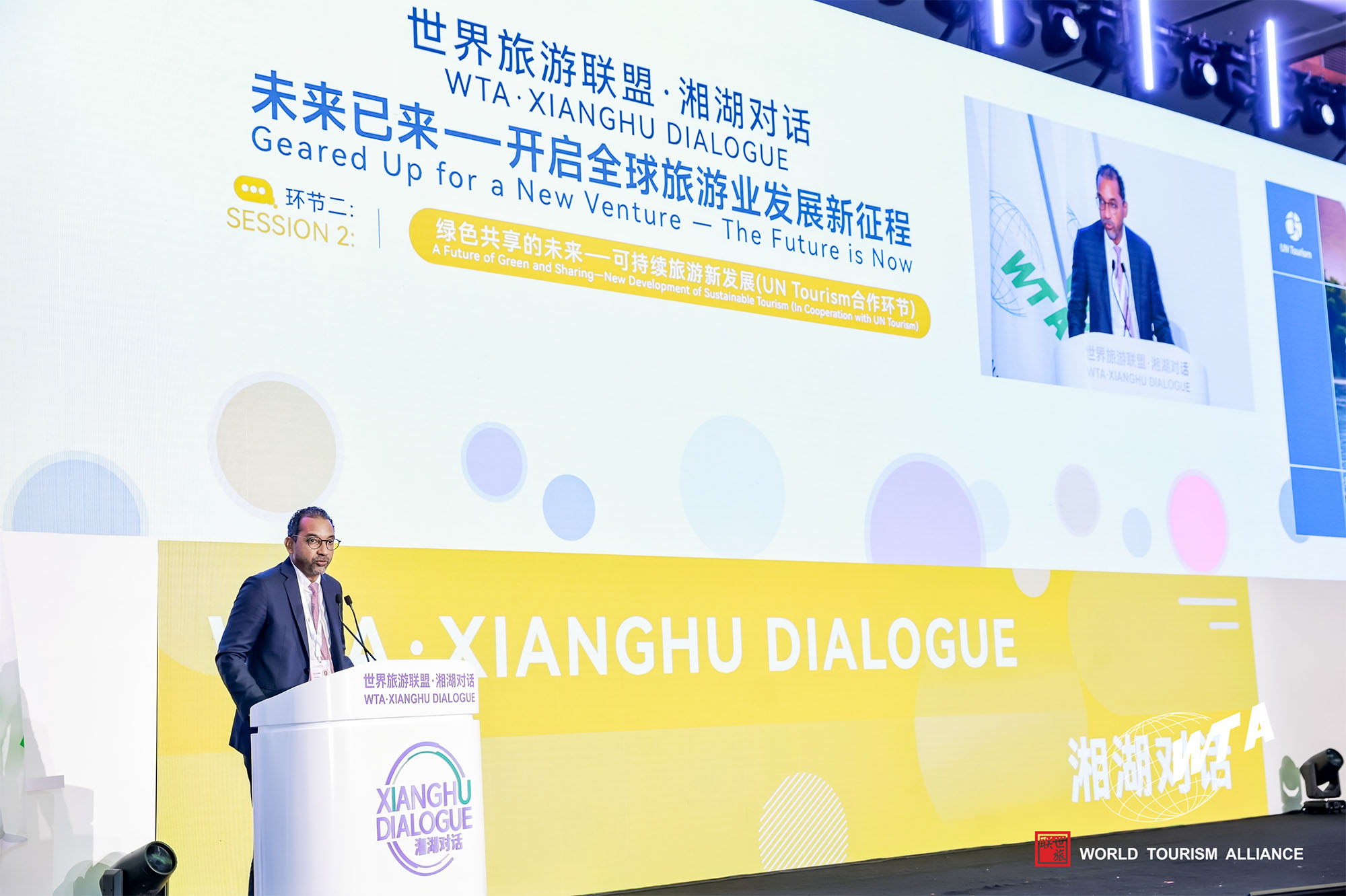2024-11-05
October 30, at the WTA·Xianghu Dialogue 2024 in Sanya, Hainan, Mr. Jaime MAYAK, Director of Technical Cooperation and Silk RoadDepartment of UN Tourism, delivered a keynote speech on "UN Tourism Approach to Sustainable Tourism Development". Below is a summary of the key points discussed.

The United Nations Tourism (UN Tourism) is headquartered in Madrid, Spain. As one of the 15 specialized agencies of the United Nations, its core mission is to promote tourism worldwide as a powerful driver of economic growth and sustainable development. We are committed to fostering partnerships worldwide to promote local community development through tourism prosperity.
For UN Tourism, sustainable development encompasses balanced progress across environmental, economic, social, and cultural domains. To this end, we introduced the "The Glasgow Declaration on Climate Action in Tourism", which encourages the tourism sector to take meaningful steps addressing climate change. We aim to reach a global consensus on climate change by 2025 and establish an international observatory network to better monitor tourism’s impact on economies, societies, and the environment. Additionally, in collaboration with relevant Japanese organizations, we have developed a toolkit to support sustainable tourism development. This toolkit helps users efficiently plan tourism projects and assess their alignment with sustainable development goals and related indicators.
We envision tourism that provides environmentally responsible, high-quality products and services, fostering a balanced and sustainable growth. In this pursuit, several critical elements must be considered.
First, the essential role of grassroots communities. Currently, we are working closely with the World Tourism Alliance (WTA) on a research project focused on sustainable tourism models. This project aims to identify and promote sustainable business models for tourism globally. We emphasize the fair distribution of tourism’s economic benefits and prioritize effective environmental and cultural protection, creating an organic fusion between tourism growth and sustainability. We place particular emphasis on community-based tourism, aiming for models that are both profitable and sustainable, backed by long-term patient capital. We support long-term strategies, such as tourism development blueprints and comprehensive planning, to minimize environmental impacts.
Second, the importance of a gradual approach. We are committed to helping communities achieve their development goals, but any work undertaken should be paced appropriately. Rushed efforts may ultimately hinder the achievement of these goals. A balanced timeline and consensus among all stakeholders are essential in reaching sustainable development objectives.
Third, integrating input from diverse stakeholders. Stakeholders in the tourism ecosystem include research institutions, local communities, businesses, and cultural and tourism-related entities such as museums, dining establishments, and travel agencies. Each has a unique role to play and can bring valuable insights and ideas to the table. We place great importance on incorporating these diverse perspectives.
Recently, Tajikistan has emerged as a leader in sustainable tourism. The country has developed a comprehensive national tourism strategy that covers both short-term recovery plans and a long-term roadmap extending to 2032. This strategy outlines six major objectives, including establishing a national eco-tourism certification system, building tourism governance mechanisms, and exploring sustainable tourism opportunities. In support of this, we assisted Tajikistan in developing a sustainable tourism plan, analyzing natural factors such as local terrain, climate, flora, and fauna, and conducting thorough environmental assessments and resource inventories. Based on these findings, we collaborated to devise a tourism product development plan and embarked on a series of practical initiatives.
Last month, tourism ministers from the Americas and Africa gathered for a significant meeting, culminating in a vital declaration. This declaration reflects the shared commitment and determination of participating countries to advance sustainable tourism development across the two continents. The declaration emphasizes the role of sustainable tourism in fostering progress in education, innovation, and creative industries. During the event, the Dominican Republic and UN Tourism forged a partnership to develop improved tourism policies, aiming to better support private sector growth in the country.

Countries like Greece, Moldova, and Guatemala are also actively advancing sustainable tourism projects. It is increasingly recognized that tourism plays a vital role in sustainability across key areas and will make significant contributions to social and economic development. In our interconnected world, sustainable development and cross-border cooperation are not only feasible but also increasingly appealing. Therefore, we must work together to unlock potential and promote a healthy, sustainable future for global tourism.